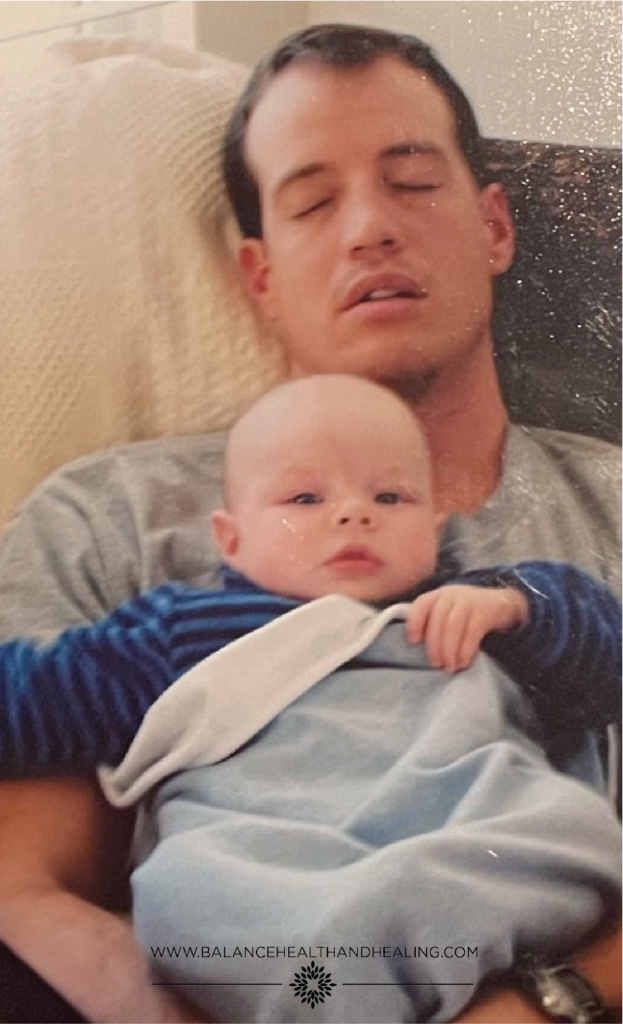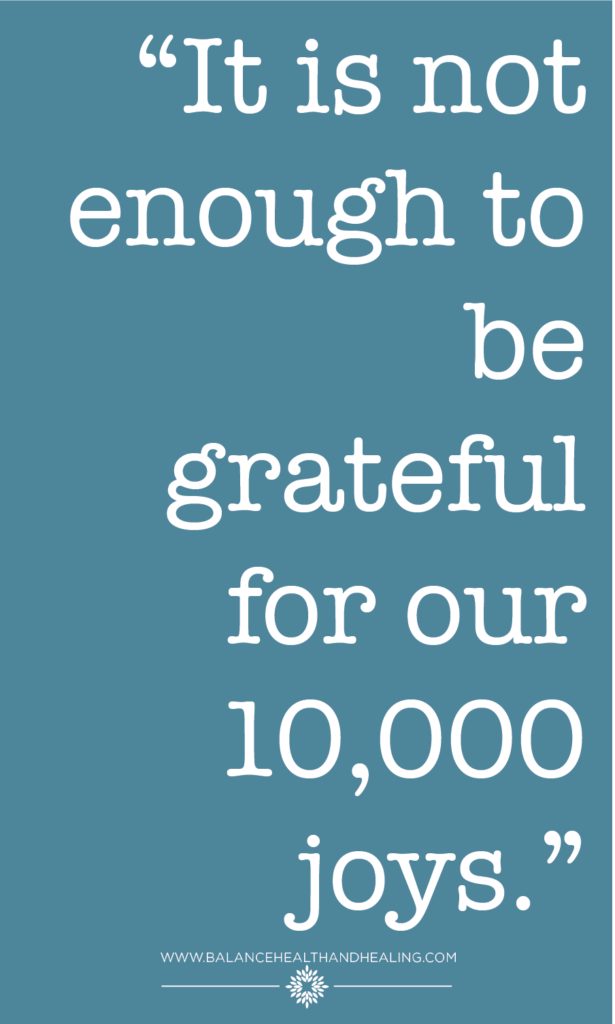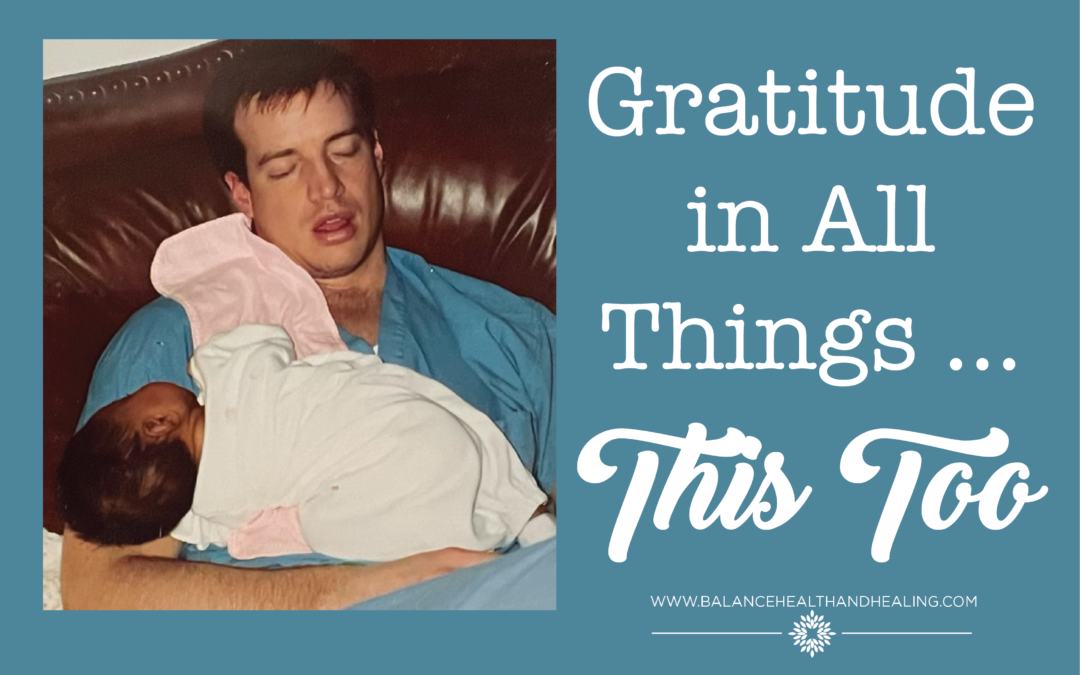 Mindfulness teaches us to have gratitude in all things. Really?
Mindfulness teaches us to have gratitude in all things. Really?
Is that really necessary? I like Buddha as much as the next gal, but come on. I can think of plenty of things in my life that I haven’t felt particularly grateful for. Shall I begin?
Like the time I was writing my dissertation with two babies and a first grader during a long Michigan winter and my guy friend was doing a year of night shifts. An entire year.
In every photo I look like a drowned rat (the result of no time for a haircut – try getting a haircut with two babies and no other adult on scene). In every photo of my husband, he is asleep with a baby propped on his shoulder. I kid you not.
But when I look at these photos I also see something besides a bedraggled me or a nodding off hubby. I see babies tucked on shoulders and I see arms overflowing with long awaited babies—more than we could sometimes handle. But, boy (and girl) were we grateful.
And though I don’t have any interest in repeating that long, gray winter, I learned many things, including that I can do hard things. I learned what really matters (babies, not dissertations). I learned that I don’t have to do it alone, and in fact life is so much better when I don’t try and go it alone.
I discovered that people wanted to show up for me and my family in so many ways, whether it was my “Michigan Mama” who took one look at me and pulled me under her loving wing. To the heart friends who took my kids in and sent me for a haircut more than once. To Costco who—manna from heaven—had the insight to build double-wide shopping carts. Mock if you will, but I tell you these things matter when you’re packing two babies and must. Get. Out. Of. The. House even if it’s only to buy more diapers and avoid your bibliography for one more hour.
But maybe it’s not too difficult to be grateful in the condition I’ve just described. Though there were challenges, they were nothing compared to the many gifts in our lives. We were safe and warm and healthy and were living in the heart of our dreams.
But mindfulness reminds us to have gratitude in all things, even our suffering. Gulp. It is not enough to be grateful for our 10,000 joys. We must also be grateful for our 10,000  sorrows, for we know we will experience all of it. We are invited to accept all things, what is known as “this too.” And though I cringe at this teaching, I know it is true. I know that my pain and suffering have taught me much more than any of my successes, but always at a high price.
sorrows, for we know we will experience all of it. We are invited to accept all things, what is known as “this too.” And though I cringe at this teaching, I know it is true. I know that my pain and suffering have taught me much more than any of my successes, but always at a high price.
But maybe that’s the key right there. Because the lessons have come at such a high price, they have been so valuable. In moments of pain, wandering and sorrow, I’ve had to determine what matters most in my life, just like you’ve had to in your own life. I’ve had to separate off what holds me back and cultivate what will help me grow. And for these lessons I am deeply grateful because with each lesson I’ve come to a new understanding of myself.
In Aleksandr Solzhenitsyn’s remarkable and heartbreaking account of life in the labor camps of Stalin’s Soviet Union, The Gulag Archipelago, he is so bold as to express gratitude for the intense pain and suffering he experienced. He writes about the small joy of looking forward to long days of hard labor because his mind was free to think. He memorized thousands of lines of poetry during his 11 years in prison.
He writes of learning to forgive, of developing tolerance, and restraining himself. He writes “Your soul, which formerly was dry, now ripens from suffering. And even if you haven’t come to love your neighbors in the Christian sense, you are at least learning to love those close to you.”
For all of this, Solzhenitsyn can “turn back to the years of my imprisonment and say, sometimes to the astonishment of those about me: ‘Bless you, prison!’”
Though Solzhenitsyn’s example is an extreme one, he makes the point beautifully: we can find gratitude even in 10,000 sorrows. How can you cultivate gratitude for the parts of your life you didn’t ask for, weren’t expecting, and have difficulty coping with?
There is no hiding from what is real, no hiding from pain. Acknowledge it, keep breathing and accept that this too has something to teach you. And be grateful. Be grateful for the chance to learn the lesson.
The Gulag Archipelago by Aleksandr Solzhenitsyn (1985)

